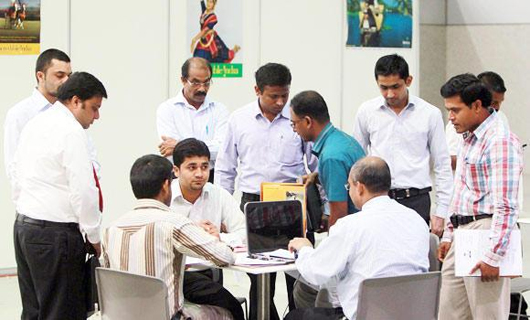
Jeddah, May 9: A prominent labor expert has suggested that the Kingdom will require expatriate manpower in various sectors over the next 40 years.
Abdullah Dahlan, former Saudi representative to the International Labor Organization (ILO) and chairman of the board of trustees of the University of Business and Technology, also reiterated the need for more Saudi men and women to match their specialties with labor market needs.
There are currently 2.5 million people out of work in the Kingdom, of which 44 percent are university graduates.
“While unemployment figures are on the decline according to a recent study conducted by the university, the relatively high unemployment rate among university graduates is due to the fact that more than two-thirds of these graduates are holders of theoretical academic degrees that offer no vocational skills, while the other third are science graduates,” he said.
Another reason for lack of employability, said Dahlan, is unsatisfactory education levels.
“A low-quality education results in less qualifications, thus requiring extensive training for requalification into the labor market,” he said.
Dahlan prefers not to blame authorities. He recommends instead focusing on educational reforms that will help enhance teaching levels, particularly with the support of Education Minister Prince Khaled Al-Faisal in revamping the education system.
“Women represent a significant component of the workforce and must have their rights met, especially since they account for the highest unemployment rates,” he said.
“There are three variables that must be altered to improve work environment and make employment more attractive, which include restructuring syllabi without placing special emphasis on religion and Arabic and introducing courses that are essential for today’s work market, such as English language courses.”
Dahlan also suggested introducing courses that teach simple business concepts in order to build students’ hands-on experience.
University disciplines should be similarly restructured to meet market demands, he said.
More than seven million of the 20 million Saudis are under the age of 15, while seven million are unemployable, according to a statistical study conducted in 2012.
Hussein Al-Alawy, the university’s director, said that his institution has sought to provide quality vocational education since it was founded a few years ago.
The founders are currently working on establishing a college of medicine and a university hospital over the next two years, he said, confirming that land has been purchased for the construction of buildings for these majors.
He also said that the Kingdom’s Higher Education minister has issued approval to introduce the insurance specialty from the beginning of the next academic year.
“New students will soon be able to apply for this major, which is one of the most sought after disciplines in the Saudi labor market today,” he said.
The current Saudi insurance market is estimated at more than SR21 billion and includes 34 licensed companies.
The market is expected to be worth SR34 billion by 2015.
Al-Alawy also said that the Kingdom, represented by the Ministry of Higher Education, seeks to equip highly qualified Saudi cadres in disciplines relevant to the labor market.
The university will open admissions for majors such as civil engineering at the College of Engineering to meet market needs, he said.
“The decision of Custodian of the Two Holy Mosques to give young Saudi men and women scholarships has allowed and supported many students to complete their undergraduate degrees,” he said. “Our ‘education for employment’ logo is a motto that is consistent with the modern-day era.”
The university will celebrate the graduation of 250 students on Thursday during a ceremony to be held in Jeddah in the presence of Jeddah Gov. Prince Mishaal bin Majed.





Comments
Add new comment